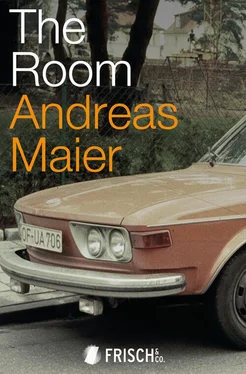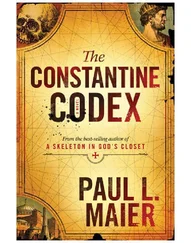Uncle J, in his room.
They always told me he was sleeping. Whenever I came to to the Uhlandstrasse house, I was told to keep the noise down because Uncle J had worked the late shift (or the early shift, as the case may be). That was my presence in this house as a child: I would be dropped off by my mother, handed over to my grandmother, and there was always this third person there, but one who never made an appearance: my uncle J. He was there, and yet he wasn’t. I spent hours in that house, still freshly ventilated back then, constantly filled with the fear that, at some point, my horrendous uncle would come down the stairs. Then I would have to sit with him in the kitchen, and my grandmother would end up going to Schade & Füllgrabe, and I would have to go down to the cellar with my uncle. He always appeared out of nowhere, and then my existence for the next few hours was completely different to how it had been in the hours before. When my uncle wasn’t there, I was free to move through the Uhlandstrasse house as I pleased. It was my favourite place and I would look forward to being dropped off there; I could be alone, my siblings weren’t there, I liked the rooms, I liked the kitchen, I could roam around for hours on end looking at all the objects, which always seemed important, especially the photographs of the old, long-since-deceased Bolls. There were a great number of them on the bureau. An unknown man in uniform in front of an unknown landscape, perhaps in Russia, or perhaps at home in the Reich, you couldn’t tell from the landscape, and the man in the uniform was deceased too. Or the picture of the young girl with thick blonde pigtails, staring vivaciously into the camera and considerably older in the picture than I was at the time. Throughout my entire childhood, I could never really believe that this little girl was one and the same person as the Aunt Lenchen I knew. Her husband was one of the first to die in the war, on the second day of the conflict, the 2nd of September, a day after my birthday and yet twenty-eight years before my birth, for I was born on the first of that month, the same day the War began. Aunt Lenchen’s photo (not in the Bund Deutscher Mädel uniform, but in a white blouse, a portrait from the chest up) was something from another world, a world they had all sealed off, each in their own way, disposing of all the regalia of the time. The abbreviation BDM was never even uttered when I was a child. Just that one photo was allowed to remain, the man in uniform, the dead man. I’m sure that they must have explained to me back then who he was, but either I never understood or was never able to remember, perhaps because I never read his name on one of our gravestones. Even my grandfather Wilhelm, J’s father, was a complete stranger to me, looming out of an ancient past in black-and-white, even though he had been dead only as long as I had been alive. We could almost have reached our hands out towards one another. We could almost have looked into each other’s eyes, we, the artistic ones. My grandfather has always been dead for the same number of years I have been alive. I presume that the man in the Wehrmacht uniform was Aunt Lenchen’s husband, but I’ll never find out because the photo doesn’t exist anymore, like almost all the photos on the bureau and the cabinet and my grandmother’s little glass table (next to the desk). When I was four or five years old I would run through my grandmother’s house, alone and happy, never realising that I was moving through a house that was predominantly defined by the dead. After all, my grandmother, as I realised much later, became a widow only when I was born. To me it seemed as though the present was separated from the past in the photos by at least a thousand years, as if by some displacement of time that was comprehensible only in a mythical sense. The house was populated by these little black-and-white photographic spectres, which to me had just as great a presence in the rooms downstairs as their actual inhabitants, those who had the rights to the house and its rooms and everything in them. And everything was always quiet; the only thing I ever heard in this house was the cooing of the pigeons and the low-pitched clang of the bells from the Bad Nauheim Dankeskirche, the first music I ever knew. It would be another thirty years before the noise-reducing double-glazing was installed. Looking back, I realise now that the house used to be a museum to me, with my grandmother as the museum’s custodian. Until her death, nothing changed in the living room, nor in the dining room, and my grandfather’s bureau in particular was never touched, just continually dusted and cleaned and polished, either by my grandmother in her apron or by Aunt Lenchen in her apron (presumably she dusted the effigy of her own youth, too) or by one of the various cleaning ladies, still German in the beginning and also apron-clad, but from the eighties onwards predominantly Yugoslavian and no longer apron-clad. After my grandmother’s death, everything was cleared out at once, everything disappeared, even the furniture was removed. It wasn’t until seven years after my grandmother’s death that I began the reconstruction work. Where had all the things been taken to? The tiny, bronze-cast Viking ship that kept me entertained throughout my entire childhood? The black stone shelf (made from diabaso, like our gravestones) above the heater in the living room alcove. Three objects used to stand on it, all of which were equally important to me; it was a cosmos, headed up by a Viking ship that’s no longer there. The ship is there only in my mind now, still immense like a real Viking ship; the sofa upholstery was the North Sea across which it sailed. Next to the ship, a metal elephant with a hollow stomach that you could peer into when you turned it around; the ship and the elephant had always belonged together. The third object was a bowl made of light-green stone, which I also used to play with on the sofa. When I was little, everything had to have its place and order, these objects had been where they were for as long as I could remember, and every time I came to the house they were where they were supposed to be. Like with my uncle, but on a miniature scale. He always needed things to be in order too, just like I did when I was four or five. And his equivalent of my Viking ship, the ship of my childhood, was the Wehrmacht tank and the mountain rescue, and unlike me he stayed that way for his whole life, as it wasn’t long before I was no longer interested in the moon landings, nor the Carrera racetracks with their remote control and speedometers. But these three objects are still a world in themselves, and all of them are gone and no longer in their place and no longer in order, just like my uncle is gone too. And now, here in his room, I have to try to put everything back in its place using my own words.
Almost as soon as my grandmother died, the house took on a new function. Nothing remained, only the house itself. When I stepped inside it for the first time again seven years later, in 1999, I was shocked. To be honest, shocked almost to death. Ever since that day, this house has defined my life. This house, this place, the street, the Wetterau, and above all the room I am writing this in now. And I was a child and ran through the house and fell in love with it, with this hybrid of death and life, a house which, even back then, predominantly consisted of memories of those who had once lived in it. The house in Uhlandstrasse had been there before my parents came, before the house in Mühlweg. It was as though it had been transported from another world into the present. A house of silence, not a house of life. I ran though the house, up the stairs, to the bookcase where I was always reading the travel stories from my grandmother’s Reader’s Digest volumes. I was a day-dreamer when I was a child; my uncle wasn’t the only one. He dreamed of mountain rescue, while I dreamed of the big wide world in the Reader’s Digest volumes. As long as everything was in order and intact, everything was okay. I ran upstairs, selected a volume and settled down with it on the sofa (it was around the time when my grandmother started giving me brandy chocolates and egg liquor, when I was five or six). I lived freely in this house and was happy in this bottomless melancholy (at home, I couldn’t bear to even be in the same room as one of my siblings anymore), but then the door opened upstairs, my uncle came out of his room and everything changed.
Читать дальше











